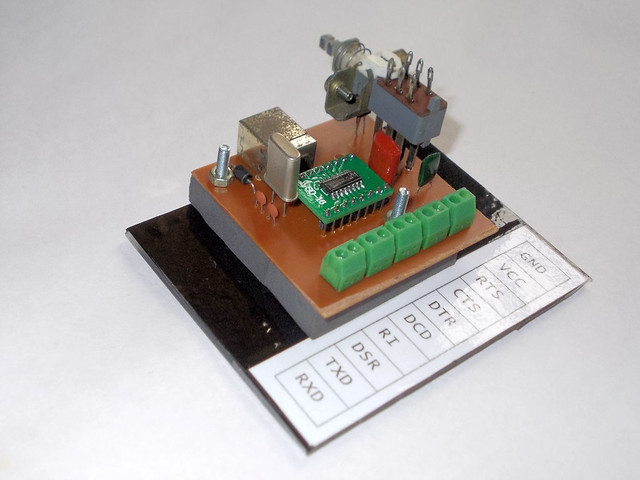This post is about experimental USB to 3.3V/5V serial TTL adapter which we build recently to work with both 5V and 3.3V MCUs. This project is mainly based on CH340G seral-USB chip. CH340G is cheap and commonly available serial-USB convert IC and now it's commonly found on Chinese versions of Arduino development boards.
FTDI's FT232 is another possible alternative for this kind of project, but we drop it because of its famous device driver base chip locking issues. Also, compare with FT232, CH340G is cheap, commonly available and simple to construct with a minimum number of components.
In this module, we incorporate a 5V/3.3V voltage selector switch to avoid interface matching issues due to different voltage levels of mainboard/MCU and serial TTL adapter.
In prototyping stages, we use CH340G with breadboard by using SO-16 to DIP16 adapter and supplied PCB is also based on using the same adapter. Except for CH340G all the other components in this project are standard through-hole type components and may not need any special soldering techniques for construction.
In prototyping, we test this adapter successfully with several MCUs which including PIC18F452, PIC16F887, LPC2103, ATmega8, ATmega32, and STM32F103C8. The device driver for CH340G is available to download at wch.cn. Schematic and PCB design related to this project are available at google drive.
FTDI's FT232 is another possible alternative for this kind of project, but we drop it because of its famous device driver base chip locking issues. Also, compare with FT232, CH340G is cheap, commonly available and simple to construct with a minimum number of components.
In this module, we incorporate a 5V/3.3V voltage selector switch to avoid interface matching issues due to different voltage levels of mainboard/MCU and serial TTL adapter.
 |
| A prototype version of CH340 USB to serial adapter. |
In prototyping stages, we use CH340G with breadboard by using SO-16 to DIP16 adapter and supplied PCB is also based on using the same adapter. Except for CH340G all the other components in this project are standard through-hole type components and may not need any special soldering techniques for construction.
In prototyping, we test this adapter successfully with several MCUs which including PIC18F452, PIC16F887, LPC2103, ATmega8, ATmega32, and STM32F103C8. The device driver for CH340G is available to download at wch.cn. Schematic and PCB design related to this project are available at google drive.
Comments